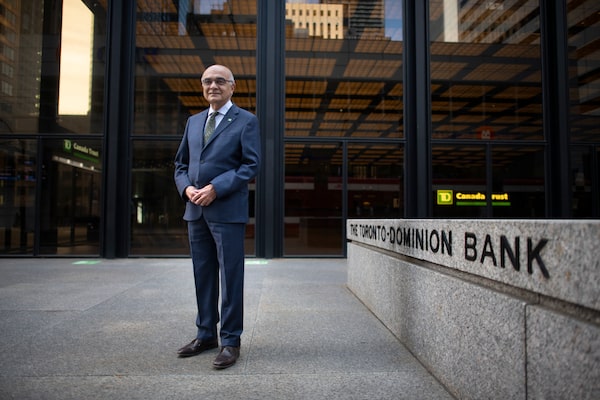
Bharat Masrani, Group President and Chief Executive Officer of TD Bank Group, outside the bank offices in downtown Toronto, Sept. 3, 2020.Fred Lum/The Globe and Mail
As Bharat Masrani watches deposits pile up in customer accounts at Toronto-Dominion Bank, he raises a pivotal question: How soon can some of that pent-up spending power be “unleashed” into North American economies?
TD’s chief executive has sounded cautiously optimistic about economic activity of late, pointing to pockets that have started to bounce back. Yet his own bank is tilting toward more pessimistic predictions for a protracted and uneven recovery from the pandemic, and he says the clock is ticking to recapture some of the lost spending that could help propel that rebound.
“The unknown here is, once we get past the pandemic, once the science catches up, a vaccine works, what level of spending might be unleashed on the economy,” Mr. Masrani said in an interview last week. “The longer it goes, the more difficult it becomes.”
That dynamic is a serious risk for TD, which is more reliant on retail banking than its Canadian peers. Although deposits are up, lower consumer spending has eaten into fees, demand for new loans has slowed, and rock-bottom interest rates have compressed lending margins.
In the latest fiscal quarter, TD’s retail banking profits improved from the previous three months, when the economic lockdowns were most severe. But profits fell 33 per cent in Canada and 48 per cent in the United States, where TD has a network of more than 1,200 branches, compared with earnings from the same period last year.
By contrast, retail deposits at TD were up 18 per cent in Canada and 24 per cent at the bank’s U.S. arm in the last fiscal quarter, and those swelling balances are a symptom of uncertainty about the way forward. As governments released an unprecedented flood of stimulus, spending hundreds of billions of dollars to stave off an economic calamity, customers have stashed away more of their spare cash. A crisis makes some people more keen to save, Mr. Masrani said, but also “there has not been an opportunity to spend.”
The pandemic made it difficult, even dangerous, to do something as simple as browse through a store and buy a shirt, he said. “Multiply that a gazillion times” and a bulge of unrealized economic activity builds, but the key question is how much of it has only been deferred and how much has been lost altogether.
Waves of stimulus “have cushioned the downdraft” on the economy, he said. As Canada and the U.S. have gradually loosened public-health restrictions, many businesses have reopened, some lost jobs have been restored, and cross-border trade has proven resilient despite some disruption to supply chains. In certain places, reopening plans moved too quickly and COVID-19 infections surged again – as happened in Florida, where TD has a large presence. “But generally I’d say the trend has been of reopening,” Mr. Masrani said. “I’ve not seen any jurisdiction actually say: We’re going to go backwards here.”
As relief programs expire, however, consumers who are still unemployed or underemployed may burn through their savings to keep up with household bills and basic needs rather than spending at restaurants, retail stores and tourist destinations – key sectors of economic activity that Mr. Masrani says are most at risk of getting left behind.
TD’s own recovery plan is an example of the progress and peril of reopening. The bank closed about 40 per cent of its Canadian branches early in the crisis, but Mr. Masrani expects all of them to be open again in the coming weeks. There are more people working in TD offices than there were three months ago, and about 4,000 staff have been redeployed to new roles. Yet, most are still working remotely and expect to continue doing so at least until next year, as bankers assess the risks of flocking back to densely packed office towers.
After leading the bank’s early response to the crisis from home, Mr. Masrani now works more often from his Toronto office. But the financial district it overlooks is still largely empty. And, like many people, Mr. Masrani has found the pandemic restrictions frustrating. “I can’t remember being in one city, continuously, for this long,” he said. “It’s crazy.”
The 33-year TD veteran is an experienced risk manager with a calm demeanour. He led the bank’s U.S. arm through the 2008 financial crisis, and he is pragmatic about the challenges ahead. He predicts TD will continue to attract new customers through the recovery by focusing on core products such as chequing accounts, which help forge lasting relationships that will pay off over time.
“I don’t think any bank out there would say: ’Oh, I love low interest rates where they are.’ But what we find is we’ve seen this before and we know how to operate in it,” he said. “Our belief has always been that growth actually overcomes all challenges. And I expect TD to continue to grow like we have for the past 165 years.”
The unknowns of the pandemic fight – just what it will take to beat back the virus – present a new kind of wild card, but Mr. Masrani said he sees encouraging signs that “the science is catching up.”
“It is easy to become pessimistic and say: ’Oh my God, what’s going on?’ But you can see the resilience of Canadians and Americans, and I feel good,” he said. “Every crisis is different, and in my life I’ve seen so many of them. But one thing I know for sure: Every one of them ends.”
Your time is valuable. Have the Top Business Headlines newsletter conveniently delivered to your inbox in the morning or evening. Sign up today.